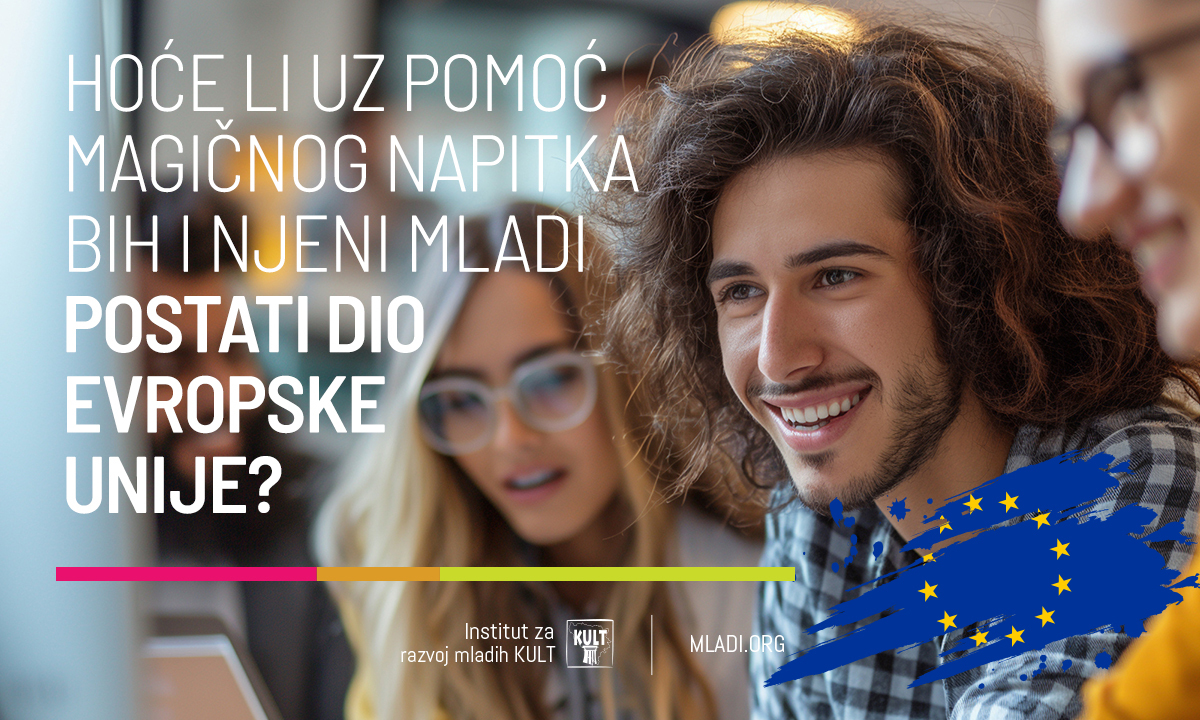The Institute for Youth Development KULT is partner to the Gender Equality Agency of BiH and the OSCE Mission in BiH in advocating for the implementation of public policies in the area of gender equality and raising the consciousness of youth about the importance of equal representation of both genders in politics. In the pre-election period, youth will have an opportunity to send a message to political parties regarding their needs and demands in the area of gender equality, and will be prompted to give equal consideration to candidates of either gender, without discrimination.
In addition to the Institute, at least 13 other organisations dealing with human rights in BiH will conduct activities aimed at equal political participation of both genders and empowering women in the political election process as the under-represented gender in politics. Yesterday, the Gender Equality Agency, as part of the project Increasing Political Parties’ Commitment to Gender Equality, implemented with the support of the OSCE Mission in BiH, held a consultation meeting with organisations, with the goal of mapping their initiatives aimed at improving the position and increasing the numbers of women in the political and public life of BiH. During the meeting, participants planned and agreed on a synergistic effect of activities conducted by different organisations and institutions with a common goal – equal political participation of women and men. All activities will be promoted on social networks, with the hashtags #jauti?em and #jaglasam.
The Institute for Youth Development KULT will conduct consciousness-raising activities with the goal of influencing the behaviour of youth in voting for political candidates, and an effective communication of youth needs in the area of gender equality, with the ultimate aim of a programmatic approach of political parties. The Institute will contribute to the youth’s understanding of the concept of gender equality, which is not appropriately implemented, despite regulations stipulating the inclusion of at least 40% of the under-represented gender on voting ballots, and their inclusion in legislative bodies, as well as rules for ranking candidates on the ballots. The Agency’s data on local elections in 2008 and 2012, indicate that women were at the top of the voting ballots in only 10% of cases, and comprised 85% of candidates for positions intended for the under-represented gender. The Institute for Youth Development KULT, in partnership with the Centre for International Development of the State University New York (SUNY/CID), through the project Strengthening Governing Institutions and Processes in BiH, contributing, among others, to strengthening the role and capacities of women in governing institutions, processes and systems.
According to Adnan Kadribaši?, Expert Associate at the Gender Equality Agency of BiH, political parties had already been invited to prove their commitment to gender equality by signing and promoting the Statement on commitment to gender equality for political parties. The statement, which, according to the Agency’s data, has so far been signed by only one political party, contains the following:
“We, the leaders of political parties, guarantee with our signatures our commitment to gender equality. We fully acknowledge the significance and need for equal participation of women and men in public and political life. Having recognised gender equality as one of the pillars of democracy, we, as political leaders, state that we shall:
1. Respect all provisions of the Law on Gender Equality in BiH, and ensure the implementation of a legally based level of participation of women in decision-making bodies, and structures of executive, legislative and representative branches of government.
2. Equally promote female and male candidates, and enable equal access of either gender to campaign resources for conducting the campaign, media and financial resources, to ensure a just treatment of the members of parties participating in the elections.
3. Actively advocate gender equality, showing genuine commitment and serious intention of including the gender perspective, and achieving progress in the area of gender equality.
4. Acknowledge the role men can play in promoting the issue of gender equality; therefore, these issues will not be treated as the exclusive responsibility of women in political parties.
5. Include the issue of gender equality in the programmes of political parties, internal documents and training courses, in order to achieve a better understanding of the importance of gender equality, among members of political parties.
6. Condemn sexist comments, hate speech or any other type of discrimination by members of political parties, which will serve to demonstrate our commitment to the principle of non-discrimination.
7. Commend the cooperation with the institutional mechanisms for gender equality, non-governmental organisations, the media, citizens and partners in promoting gender equality.
With the goal of acknowledging the need for exerting additional efforts in implementing public policies in the area of gender equality, i.e. the different influence social development can have on women and men, i.e. the fact that women face specific forms of gender discrimination, we show our commitment through the following:
8. Support the equality and equal opportunities for women and men, including those pertaining to vulnerable groups, with an emphasis on the labour market, keeping in mind the low rate of employment of men, and especially women in BiH.
9. Support the development and implementation of policies which stipulate that women, or parents must be given adequate financial support during maternity or paternity leave, as well as policies which increase the number and quality of pre-school education institutions.
10. Support programmes and policies which enable the harmonisation of the professional and private lives of men and women.
11. Provide support to safe houses, SOS hotlines and multi-disciplinary teams in their attempts to protect victims of domestic violence, which are mostly women.
12. Ensure that the needs of Romani women, women with disabilities, women from rural areas, immigrant women, women victims of war and refugee women, are taken into consideration when creating and implementing social inclusion policies, having in mind the multiple discrimination the aforementioned groups are facing.“












Leave a comment